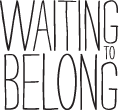Meeting our daughter’s birth mother
How adoptive families can navigate this relationship
By Wendy Kittlitz
Our family recently returned from a missions trip to Haiti. One of the highlights was meeting our daughter’s birth mother for the first time. It was an amazing experience, to say the least!
Subsequent to adoption, what is the place of a birth parent in the life of a child, and how do adoptive parents navigate this? Some adoptive parents would like to behave as though the birth parent no longer exists. Some embrace a warm, friendly, open adoption experience. Others know nothing about their child’s birth family and can only speculate about who they are, how they felt and the circumstances of their decision. Others fear the birth family who abused, neglected or harmed rather the child rather than protecting them.
Whatever the circumstances, some things are essential to remember. Whether or not your child ever meets their birth parent, they are psychologically present in your child’s life. Whether or not you talk about it, your child will wonder and question and wish that they could know more about where they came from. I remember a parent who once told me that she was sure her son never thought about his birth mom. One day, they were having a heart-to-heart discussion and he revealed that he thought about this topic all the time but was afraid to tell her until she brought it up.
We do well as adoptive parents to give our children permission to connect with this part of who they are. They may need continued protection from their birth family by us, to learn how to develop a relationship of their own with an involved birth mother, to grieve the loss of not having knowledge or contact or to have more information than just personal contact. The essential thing is that we continue to place the needs of our child ahead of our own and give them what we can without feeling hurt or threatened in the process.
It’s important to remind ourselves that our children belong first to God and that He has sovereignly given them into our care, regardless of the means by which they came to us. We need not be threatened in our position in their lives. The more they know about their birth families, the less they are able to fantasize about people who might love them more than we do when we discipline them or who might better understand them when we struggle to communicate with them. Embracing all that we can know about birth families is a gift to our children and can draw us closer together rather than jeopardizing our relationship with them. There is a reason our kids’ birth parents could not parent them. In most cases, it’s not because they were bad or dangerous people, just broken people unable at the time to give our children what they needed and deserved.
It’s both sad and joyful to have a reunion in safe and good circumstances as we recently experienced. We rejoiced that we could learn more about each other, to be in one another’s presence for a time and to know that we shared a love for this child that was different but similar. Yet even with their physical resemblances, we realized that our daughter and her birth mother were strangers to one another. Barriers such as distance and language prevent us from having much continuing interaction, but we have ways to stay in contact which is meaningful for us and for our daughter.
Wendy Kittlitz is vice-president of counselling and care ministries for Focus on the Family Canada. She has worked as an adoption professional for 15 years and is also an adoptive mom.
© 2012 Focus on the Family (Canada) Association. All rights reserved.
